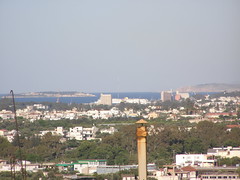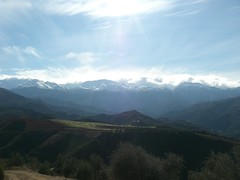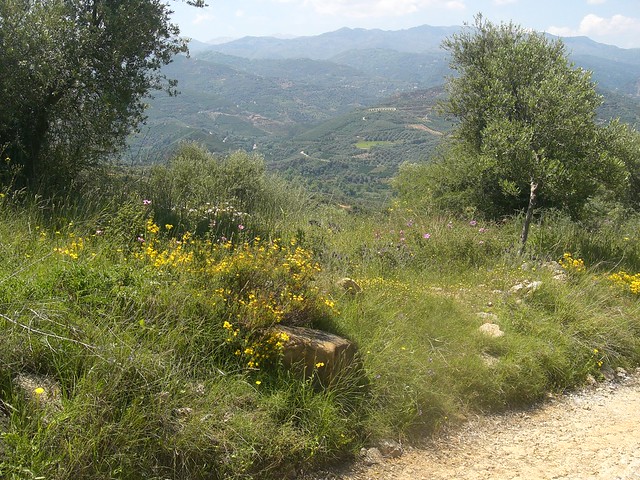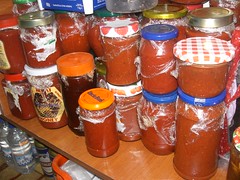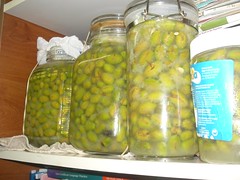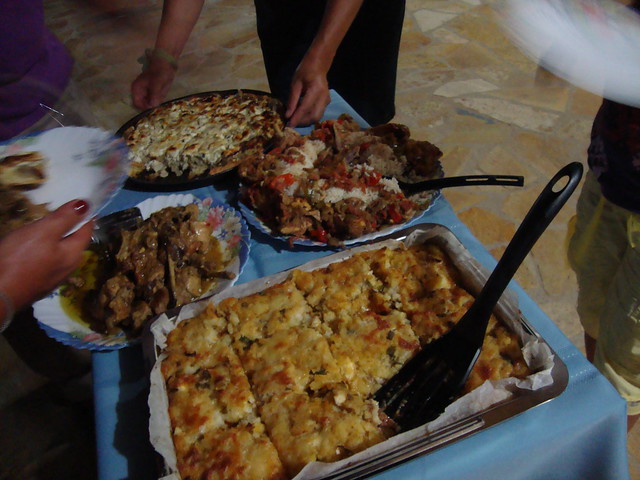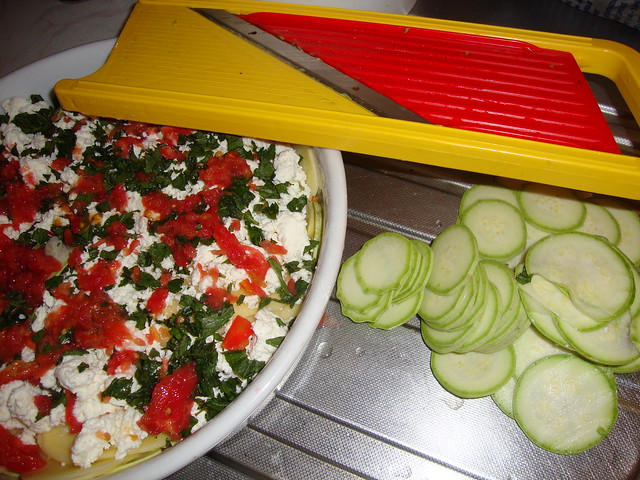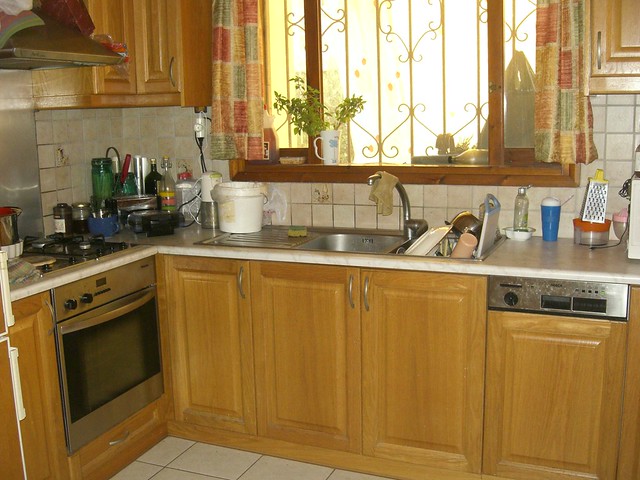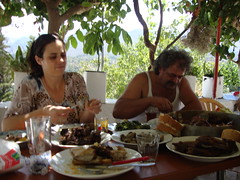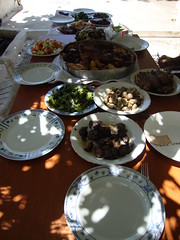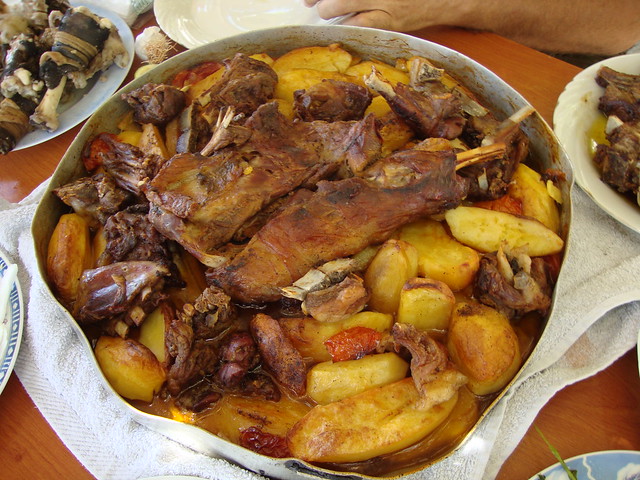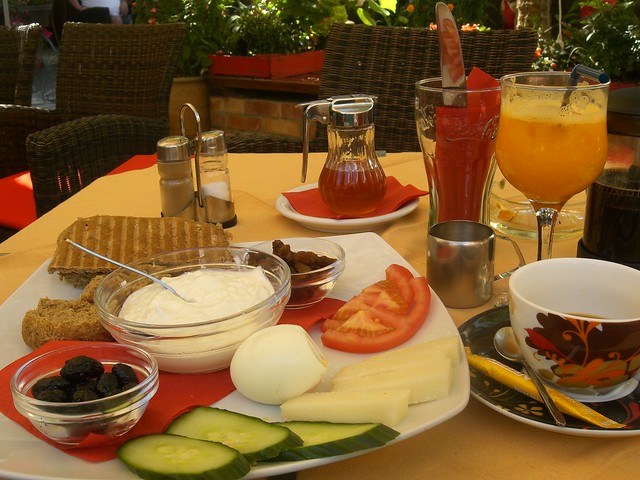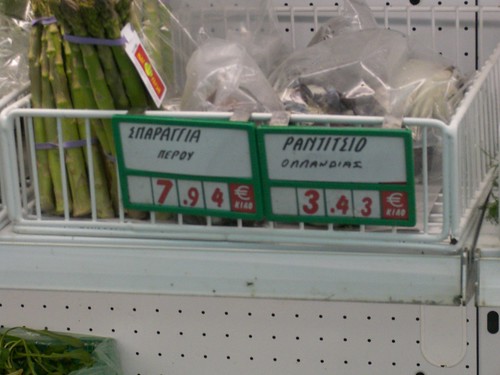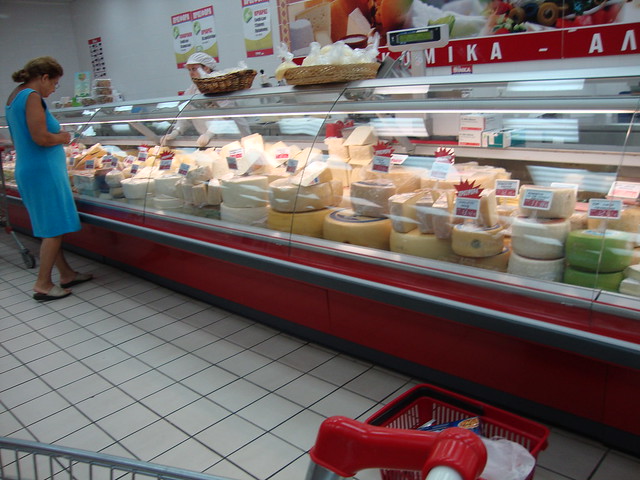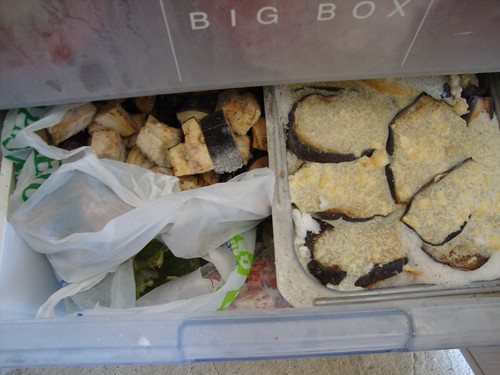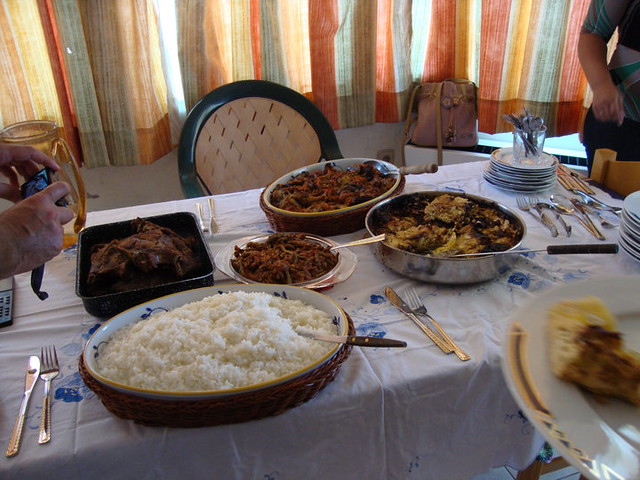We're not really as independent as we think or would like to believe that we are - we are now interconnected, and will always be dependent on each other.
To throw a spanner in the works, we rarely hear about how Scotland's food supply will be affected by the vote, do we? It's taken for granted, I suppose, that highly developed countries do not produce much of the food they need to feed their nation. It's not considered important to sustain their politico-economic survival; they happily import most of their food needs and take it for granted that these imports will always be plentiful.
Such countries also take into serious consideration food rules and regulations, and are very bookish, being highly knowledgeable about a wide range of topics without actually having direct experience of the topic in question, perhaps due to weather and landscape.
As an English teacher in an academic environment, my job involves reading and translating a lot of scientific texts. I have been working on a translation (into Greek) of a report concerning what is seen as desirable skills to be taught in training programmes for sustainable organic farming courses, as suggested by questionnaire respondents from Greece, Spain, Hungary, Croatia, France, Italy and Austria. Based on my work, I present a (rather long) list of questions about sustainable farming, and how likely it is that your country can succeed in providing its citizens with food produced in your own country. It is based on the knowledge acquired over time by individuals, in order to maintain a sustainable farming business.
CAN YOU/DO YOU:
- understand the differences between conventional, integrated and organic farming in terms of inputs and farming techniques?
- understand the impacts of conventional farming practices on resources-vulnerability and irreversibility?
- understand the ecological basis underlying the dynamics of agriculture?
- understand the environmental complex-the behavior of the plant Is aware of the basic farming work skills?
- understand the interactions between several agro-systems in the scale of a territory?
- understand the importance and impact of the agro-ecology in the micro and macro environment?
- understand the connection of the agro-ecology with the market (better communication with the market)?
- design and apply management plans taking into account the ecological components and functions in various agro-ecosystems?
- communicate with farmers?
- understand the impacts of conventional farming practices on resources-analysis of the impact of agricultural management?
- understand the ecological basis underlying the dynamics of agro-understanding of the components and ecological functions in agro-ecosystems?
- understand the environmental complex, the sum of interactions acting on a growing personal and collective farm?
- apply ecological components and functions in different agro-ecosystems?
- use basic farming work skills?
- solve simple problems in the area of environmental protection and agricultural production
- link economic, social and environmental fields
- understand the technical basis of the agro-ecological transition, its conceptual design and technical and economic changes in the farm?
- know the Legislations and Regulations for the transition to organic farming?
- have a command of/be fully conversant with the relevant OA legislation & its application to certification standards to farming?
- have an awareness of the importance, methods and certification of organic production?
- Is familiar with the management and maintenance of quality?
- have knowledge of the basics of social psychology on the theme of resistance to changes (since Lewin, 1950’s)?
- understand the agro-ecological transition of planned changes for converting a conventional farm into an organic farm?
- know and understand Legislation and Regulations for the transition to organic farming?
- translate regulation requirements into changes of agriculture practices?
- master technical developments and measure economic impacts?
- find information and communicate via the internet ?
- understand the importance of the interaction between populations (biodiversity, functional diversity, ecological diversity) during farming production?
- manage biodiversity conservation and productive purposes?
- understand the role of agrobiodiversity in farmscape planning, plant protection, soil fertility and weed management?
- know the rules and expectations of seed-production, storage, processing, and preparation?
- understand the capabilities for raising maximum yield through a proper production plan, plant selection and protection?
- understand biodiversity, functional diversity, ecological diversity-is able to manage them effectively during farming?
- recognize the impact of certain plant cultivation activities on the environment and their acceptability in terms of biodiversity conservation?
- produce seeds?
- think the food autonomy for cattle in a farm scale, using density of animals and available surface areas?
- plan agricultural production with reduced harmful impact on biodiversity?
- understand the soil as a living medium - is aware soil components affecting soil quality and fertility and the importance of their ontogeny ?
- understand the dynamics of organic matter in the soil ?
- understand the role of organic matter in the soil and the importance of the living environment as a dynamic?
- control pests and diseases of edaphic origin?
- understand the role of the soil alive in the control of diseases and health of plant?
- understand the agronomic and pedodogic functioning of a soil?
- understand the mechanisms of maintaining and increasing soil fertility through litter and green manure crops?
- understand the importance of conducting soil analyses?
- understand the differences in the inputs for soil nutrition in different farming systems?
- know the differences between fertilizers and amendments, schedules for the inputs in response to crop needs, has mastered the mechanics of analysis of nitrogen balance, to manage correct fertilization?
- know the main green manures, their mode of culture, schedules for destroying them, principles of degradation (restitution of nitrogen into the soil)?
- produce production site analyses?
- maintain the organic matter and soil fertility high using OA accepted techniques?
- understand the soil as a living medium - Is able to identify the functionality of the data in relation to the production dynamics?
- understand the dynamics of organic matter in the soil?
- make decisions to improve soil quality and fertility, through self-fertilization and according to the law of the OA?
- control pests and diseases of edaphic origin?
- identify those components of biodiversity most important for management and control?
- know how to observe and analyze the soil functioning (using simple tools like auger, spade, to achieve profile analysis for crop diagnosis)?
- identify beneficial microorganisms in the soil and their importance in improving soil quality and fertility?
- make proper choice, use proper method and time of pesticide application ?
- make nutrient management plans individually, and include them into systems by cultures and by technologies, taking into account crop ?
- know the effects of production process (quality, application)?
- have a strong understanding of the N cycle and how this connects to N availability for plant roots?
- understand the parameters that affect a process?
- understand the different fertilization technologies, and include them into the possible technologies?
- understand the importance of organic matter for various crops?
- have some familiarity with the possibilities of the production and / or supply of compost?
- Is aware of decomposition process and application methods?
- understand composting competence?
- produce and apply compost/ green manure?
- understand the quality and maturity of compost?
- understand and interpret analytical techniques and in situ techniques used to evaluate parameters related to the quality and maturity of compost?
- manage the composting process and to limit losses from wind and leaching?
- select the proper form of organic fertilizer for certain types of soil?
- determine quantities of organic fertilizers that are brought into agricultural area to minimize the contamination of surface and groundwater, and maximize nutritient availability ?
- organize collective actions?
- understand crop rotation and association?
- know the specifics of vegetables grown?
- understand cover crops and mulching?
- know how to apply different culture techniques as cover crops, intercropping, mulching?
- understand plant infrastructure?
- understand the role of auxiliary vegetation ?
- update your knowledge in organic and biodynamic agriculture?
- know insect-attracting plants ?
- connect organic farming techniques with their effect on agrobiodiversity, plant nutrition and crop protection?
- design appropriate rotation schemes and partnership?
- apply different culture techniques such as cover crops, intercropping, mulching?
- understand plant infrastructure?
- choose and design hedges, borders, vegetable islands to diversify and protect crops?
- have knowledge of important weeds and soil diseases?
- apply different ecological preparations for plant protection against diseases, pests and weeds?
- apply various technical interventions in agriculture, without adversely affecting the structure and quality of the soil (reduction of required actions in tillage )?
- use properly machines of cultivation?
- integrate technical exchange networks?
- use insectary plants ?
- understand the ecological management of greenhouses?
- have knowledge of different ecological cultures?
- know the principles of crop growth without soil on inert materials?
- know the specifics of growing plants indoors?
- understand specific features and risks of production in greenhouses?
- understand the different sprouting technologies and equipment?
- understand the closed sprouting system’s barriers, peculiarities, its special plant protection and maintenance?
- understand the proper techniques of non-degradable waste management and disposal of materials?
- understand energy issues (direct consumption and indirects energy costs, life cycle analyze,…) of equipment such as “greenhouses” and “shelters”?
- understand instalation and maintenance of plastic equipment and microclimate conditions?
- understand special problems of plant protection from diseases and pests in greenhouse conditions?
- understand the specifics of greenhouse production?
- have previous experience on greenhouse production?
- act in order to combat pests and diseases in greenhouses?
- understand the ecological management of greenhouses?
- schedule an annual crop rotation, maintaining soil fertility and control pests and diseases according to regulations?
- use different beneficial insects to combat major crop pests?
- master techniques of organic control in greenhouses (crop auxiliaries etc) and of fertilization ?
- have knowledge of soil diseases and crop turnover?
- insert intermediate crops or green manures between or during crops, to promote soil biological activity through the presence of plants and living roots?
- master technical and economic constraints in greenhouse production ?
- apply ecological principles in greenhouse conditions?
- produce vegetables indoors (sowing, optimal processing time and picking)?
- manage methods of biological control?
- use the proper techniques of non-degradable waste management and disposal of materials?
- understand basic features of the nutritional ecology of biological control agents?
- have knowledge of species of biological control agents available in the market ?
- have knowledge of conservation, biological control and ecological engineering methods used in open field crops ?
- know the theoretical foundations of ecology applied to plant pathology?
- understand the theoretical concepts that relate to soil-living nutrition and resistance to pests and diseases?
- understand the environmental risks of synthetic inputs and differential substances permitted in organic farming?
- know the importance of the role of weeds in agro-ecosystems and the theoretical foundations that allow the recognition of the most important species and their growth cycle?
- consider pests and diseases as regulators of agro-system imbalances, and accordingly to use early preventive control and to strengthen the immunity systems of plants?
- understand the possibilities of purchasing ecological resources, and oftheir synergy?
- have knowledge of ecological preparations to protect plants from weeds, pests and diseases?
- have knowledge of the availability of the list of approved substances?
- have knowledge of the different possibilities for controlling harmful organisms in crop production?
- have knowledge of the permitted preparations/combinations in organic farming?
- understand their limited applicabilities and impacts?
- have knowledge of important local weed species and their growth and development?
- understand alternative techniques of plant protection, compatible with organic farming?
- identify pests and key species of biological control agents?
- make decisions regarding the management of prevention techniques and control according to regulations?
- have knowledge of trophobiosis as a unifying concept in agroecology?
- use the substances permitted in organic farming?
- master pests and auxiliaries' life cycles in order to promote biological control?
- make environmental protection agents?
- prepare pesticides from farm materials ("compost brew") or from plants from environment ("nettle brew", Equisetum extracts, Tanacetum cinerariifolium extracts etc.)?
- choose environmentally most acceptable methods of plant protection?
- prepare an independent protection plan?
- recognise pest herbivores, illnesses, and disorders (visible symptoms caused by missing microelements)?
- apply the appropriate techniques to control weeds?
- master design approaches for innovative cropping systems?
- support the farmer in his agronomical technical reasoning?
- have knowledge of postharvest handling and packaging of fresh and processed products-knows what are the conditions to be met by a commodity and what are the factors of shelf life?
- have knowledge of regulations affecting the development of an ecological food-knows the rules governing the sector in postharvest ?
- understand storage principles and protection during storage of organic raw materials and products?
- have knowledge of methods of determining the period of harvest / picking, determine the physiological and technical maturity with chemical and organoleptic path?
- implement postharvest rules at the producer level or enterprise level?
- adapt to the rules governing the sector in postharvest?
- select the method of keeping the product with regard to its ultimate purpose?
- plan and execute harvesting, processing, transportationactivites and related operations?
- know the dynamics of the water cycle, biosphere level of the edafosphere and water balance in the plant?
- have knowledge of the theoretical basis from agroecology to facilitate water management in agricultural systems?
- have knowledge of the methods with the environment to ensure product quality?
- have knowledge of the quality of used water?
- understand the advantages of irrigation?
- have knowledge of the importance of preventing pollution of watercourses and groundwater?
- have knowledge of methods to manipulate the environment to ensure product quality maintenance?
- have knowledge of the methods with the environment to ensure product quality maintenance?
- know how to apply dosages based on culture and stage of growth?
- understand ecological principles in moisture conservation?
- have knowledge of irrigation methods?
- understands agro-climatic issues linked to global warming?
- understand irrigation methods which assure environmentally sound water management?
- advise farmers on optimum use of irrigation water/is able to provide/ take water samples for analysis?
- analyze water data and present it as a basis for decisions?
- extrapolate knowledge of water systems (the dynamics of the water cycle etc) to the design of crop and soil management?
- use techniques of soil management, planting, seeding and crop diversification to conserve water and can optimize irrigation?
- manage water: inputs (saving systems), limiting losses through evapotranspiration (mulch and organic mulch), surplus management (drainage, shaping boards cultures), associations of beneficial cultures, to create microclimates (agroforestry)?
- plan the installation and use of irrigation systems?
- plan the required capacity of the irrigation system and related costs of installation and usage?
- create and manage water-saving irrigation?
- calculate optimal water consumption and analyze profitability?
- apply an irrigation program ?
- master techniques for water management?
- master irrigation systems?
- have a developed consciousness of the usefulness of irrigation in agricultural production?
- implement irrigation system on agricultural land?
- prepare independently the farm’s water management and irrigation plan?
- meet the water needs and control the dose to be applied depending on the growth stage of the crop?
- know the basic characteristics of the water used for irrigation?
- know the consequences of tillage and their behavior depending on the type of soil?
- explore the features of machinery for planting, application of manure and compost, forage, and crop cultivation?
- have knowledge of proper handling of tools and machinery on a farm?
- understand tillage?
- comply with hygiene rules and food safety regulations ?
- know the machines which are specially created for Organic Agriculture ?
- stay safe at the work according to national legislation by having attended relevant training?
- master the appropriate equipment for mechanical weeding?
- master spraying equipment to ensure proper application of bio pesticides?
- know how to properly maintain machinery?
- understand the advantages and application of the planned preventive maintenance system?
- understand energetic issues (direct consumption and indirect energy costs, life cycle analysis) linked to agricultural equipment?
- know collective approaches for using agricultural equipment : group property, farmers groups, support societies?
- understand environmental impact of agricultural machinery use?
- have the appropriate handling certificates and is able to handle the machinery safely ?
- understand soil management with minimum tillage and no-till?
- fix the use of specific tools, at the right floor-and-tempering time for cultivation?
- prepare and execute machine handling and control instructions?
- drive tractors and garden tractors with implements?
- perform maintenance of the facilities?
- select and use appropriate equipment for each job, in order to maintain and enhance biodiversity, particularly in soil?
- safely and properly use machinery?
- provide proper first aid?
- know the rules regarding the labeling of organic products?
- understand the packaging industry at the national level and in exports?
- know the main functions of packaging in fresh and processed foods and the different characteristics of each?
- have knowledge of the legal regulations of processing and labeling of organic products?
- have knowledge of the importance of proper harvest time depending on the purpose of the product?
- have knowledge of the principles of organic products preservation, drying techniques and preserving ecological products?
- have knowledge of the list of approved substances and ways of processing?
- understand the role of packaging as selling tool?
- have knowledge of and introduce and maintain a complex HACCP system?
- understand the basic semi-finished and finished product production technologies?
- have knowledge of the best professional practices, standards and specifications of packaging and stripping/wrecking?
- understand energetic issues (direct consumption and indirects energy costs, life cycle analysis) linked with packaging?
- understand the process for proper selection of packaging (reusable, bio degradable material)?
- understand processing and packaging technology?
- know the basics of environmental labeling?
- differentiate the peculiarities of the labeling of fresh produce and processed product?
- have knowledge of the packaging industry at a national level and for export?
- apply this knowledge (main functions of packaging etc) to decision making in business?
- process products respecting sanitary regulations?
- handle machinery
- use methods of analysis of food hygiene to map the organic quality in farming food processing
- understand marketing channels in the eco-sector
- know how to differentiate the characteristics of the ecological food chain and all possible forms of marketing and distribution sector
- understand short channels and markets nearby
- understand the characteristics and potential of this type of marketing
- know the importance of online market and social media
- understand the importance of innovative marketing
- differentiate the characteristics of the ecological food chain and all possible forms of marketing and distribution sector
- design strategies to optimize this type of distribution with small farmers and small markets or consumer groups
- work at the enterprise level in the positioning and dynamics of eco responsible products
- know the marketing channels
- design labels and packaging of eco products in order to attract customers
- make market research and recognize optimal business oportunity
- master marketing techniques
- raise awareness about sustainable agriculture among employees and the environment
- raise awareness of the consumer about the benefits of ecological products on health and the environment
- know the importance of the tourism sector in the rural economy
- understand farm and / or ecotourism
- understand the differences between agro-tourism and green tourism
- know the basics of tourism
- understand ways of selling tourism offers
- understand the regulations and limitations regarding agrotourism (village tourism)
- be sensitive to different cultures
- communicate and transfer the culture of an area
- understand green tourism
- introduce the environmental factor within the tourism sector
- understand farm and / or ecotourism
- link concepts and requirements for greater economic diversification in rural and local areas
- quantify its project to assess its profitability
- create good communication channels in marketing promotion
- discover / plan new facilities to attract visitors
- create their own agrotourist household (on the base of possessed agricultural farm)
- find product niches to get a better price (additional income, …), combination of offerings
- master the standards required for hosting disabled people
- find advice for dealing with tourism
- make a business plan (a form of agricultural tourism, finance, market demands, marketing, resources, etc.)
- integrate agrotourism into the course of business of the farm
- deal with agrotouristic activity (i.e. to plan activity, to lead marketing, to organize the stay of guests in the household, to manage finance aspects of the activity)
- have mastery of organic agriculture communication in order to respect competition rules?
- know how to support decision making by a farmer in a context of uncertainty?
- know the basics of a Firm's Social Responsibility approach?
- have mastery of the techniques of active listening (identifying customer needs through an open questionnaire)?
- identify the difference between needs and the expectations of a farmer?
- have mastery of at least one foreign language?
- evaluate the overall performance of a technical proposal (environmental, social and economic impacts, stakeholders identification)?
- link a technical proposal and farmer 's strategic directions?
- master the stakeholders' identification in an organic farming project?
- support farmers' groups (at least, to organize meetings)?
- have some level of mastery of ICT tools?
If you answered YES to a good deal of the above questions, then you probably have the right skills to be an organic farmer and manage a sustainable farm competently. You are also most likely to be a good listener, and a good decision maker, and will be able to survive a bout of bad luck (eg finance or climate oriented) to a great degree. Such skills are what is keeping Greece afloat at the moment: while most developed countries disregard their food supply as playing a great role in their economy, and importing most of their food needs, Greece produces a great deal of fresh food that is used in its raw state by Greek citizens, as well as being exported. What's more, Greek food is considered very highly among the global community.
To throw a spanner in the works, we rarely hear about how Scotland's food supply will be affected by the vote, do we? It's taken for granted, I suppose, that highly developed countries do not produce much of the food they need to feed their nation. It's not considered important to sustain their politico-economic survival; they happily import most of their food needs and take it for granted that these imports will always be plentiful.
Such countries also take into serious consideration food rules and regulations, and are very bookish, being highly knowledgeable about a wide range of topics without actually having direct experience of the topic in question, perhaps due to weather and landscape.
As an English teacher in an academic environment, my job involves reading and translating a lot of scientific texts. I have been working on a translation (into Greek) of a report concerning what is seen as desirable skills to be taught in training programmes for sustainable organic farming courses, as suggested by questionnaire respondents from Greece, Spain, Hungary, Croatia, France, Italy and Austria. Based on my work, I present a (rather long) list of questions about sustainable farming, and how likely it is that your country can succeed in providing its citizens with food produced in your own country. It is based on the knowledge acquired over time by individuals, in order to maintain a sustainable farming business.
CAN YOU/DO YOU:
- understand the differences between conventional, integrated and organic farming in terms of inputs and farming techniques?
- understand the impacts of conventional farming practices on resources-vulnerability and irreversibility?
- understand the ecological basis underlying the dynamics of agriculture?
- understand the environmental complex-the behavior of the plant Is aware of the basic farming work skills?
- understand the interactions between several agro-systems in the scale of a territory?
- understand the importance and impact of the agro-ecology in the micro and macro environment?
- understand the connection of the agro-ecology with the market (better communication with the market)?
- design and apply management plans taking into account the ecological components and functions in various agro-ecosystems?
- communicate with farmers?
- understand the impacts of conventional farming practices on resources-analysis of the impact of agricultural management?
- understand the ecological basis underlying the dynamics of agro-understanding of the components and ecological functions in agro-ecosystems?
- understand the environmental complex, the sum of interactions acting on a growing personal and collective farm?
- apply ecological components and functions in different agro-ecosystems?
- use basic farming work skills?
- solve simple problems in the area of environmental protection and agricultural production
- link economic, social and environmental fields
- understand the technical basis of the agro-ecological transition, its conceptual design and technical and economic changes in the farm?
- know the Legislations and Regulations for the transition to organic farming?
- have a command of/be fully conversant with the relevant OA legislation & its application to certification standards to farming?
- have an awareness of the importance, methods and certification of organic production?
- Is familiar with the management and maintenance of quality?
- have knowledge of the basics of social psychology on the theme of resistance to changes (since Lewin, 1950’s)?
- understand the agro-ecological transition of planned changes for converting a conventional farm into an organic farm?
- know and understand Legislation and Regulations for the transition to organic farming?
- translate regulation requirements into changes of agriculture practices?
- master technical developments and measure economic impacts?
- find information and communicate via the internet ?
- understand the importance of the interaction between populations (biodiversity, functional diversity, ecological diversity) during farming production?
- manage biodiversity conservation and productive purposes?
- understand the role of agrobiodiversity in farmscape planning, plant protection, soil fertility and weed management?
- know the rules and expectations of seed-production, storage, processing, and preparation?
- understand the capabilities for raising maximum yield through a proper production plan, plant selection and protection?
- understand biodiversity, functional diversity, ecological diversity-is able to manage them effectively during farming?
- recognize the impact of certain plant cultivation activities on the environment and their acceptability in terms of biodiversity conservation?
- produce seeds?
- think the food autonomy for cattle in a farm scale, using density of animals and available surface areas?
- plan agricultural production with reduced harmful impact on biodiversity?
- understand the soil as a living medium - is aware soil components affecting soil quality and fertility and the importance of their ontogeny ?
- understand the dynamics of organic matter in the soil ?
- understand the role of organic matter in the soil and the importance of the living environment as a dynamic?
- control pests and diseases of edaphic origin?
- understand the role of the soil alive in the control of diseases and health of plant?
- understand the agronomic and pedodogic functioning of a soil?
- understand the mechanisms of maintaining and increasing soil fertility through litter and green manure crops?
- understand the importance of conducting soil analyses?
- understand the differences in the inputs for soil nutrition in different farming systems?
- know the differences between fertilizers and amendments, schedules for the inputs in response to crop needs, has mastered the mechanics of analysis of nitrogen balance, to manage correct fertilization?
- know the main green manures, their mode of culture, schedules for destroying them, principles of degradation (restitution of nitrogen into the soil)?
- produce production site analyses?
- maintain the organic matter and soil fertility high using OA accepted techniques?
- understand the soil as a living medium - Is able to identify the functionality of the data in relation to the production dynamics?
- understand the dynamics of organic matter in the soil?
- make decisions to improve soil quality and fertility, through self-fertilization and according to the law of the OA?
- control pests and diseases of edaphic origin?
- identify those components of biodiversity most important for management and control?
- know how to observe and analyze the soil functioning (using simple tools like auger, spade, to achieve profile analysis for crop diagnosis)?
- identify beneficial microorganisms in the soil and their importance in improving soil quality and fertility?
- make proper choice, use proper method and time of pesticide application ?
- make nutrient management plans individually, and include them into systems by cultures and by technologies, taking into account crop ?
- know the effects of production process (quality, application)?
- have a strong understanding of the N cycle and how this connects to N availability for plant roots?
- understand the parameters that affect a process?
- understand the different fertilization technologies, and include them into the possible technologies?
- understand the importance of organic matter for various crops?
- have some familiarity with the possibilities of the production and / or supply of compost?
- Is aware of decomposition process and application methods?
- understand composting competence?
- produce and apply compost/ green manure?
- understand the quality and maturity of compost?
- understand and interpret analytical techniques and in situ techniques used to evaluate parameters related to the quality and maturity of compost?
- manage the composting process and to limit losses from wind and leaching?
- select the proper form of organic fertilizer for certain types of soil?
- determine quantities of organic fertilizers that are brought into agricultural area to minimize the contamination of surface and groundwater, and maximize nutritient availability ?
- organize collective actions?
- understand crop rotation and association?
- know the specifics of vegetables grown?
- understand cover crops and mulching?
- know how to apply different culture techniques as cover crops, intercropping, mulching?
- understand plant infrastructure?
- understand the role of auxiliary vegetation ?
- update your knowledge in organic and biodynamic agriculture?
- know insect-attracting plants ?
- connect organic farming techniques with their effect on agrobiodiversity, plant nutrition and crop protection?
- design appropriate rotation schemes and partnership?
- apply different culture techniques such as cover crops, intercropping, mulching?
- understand plant infrastructure?
- choose and design hedges, borders, vegetable islands to diversify and protect crops?
- have knowledge of important weeds and soil diseases?
- apply different ecological preparations for plant protection against diseases, pests and weeds?
- apply various technical interventions in agriculture, without adversely affecting the structure and quality of the soil (reduction of required actions in tillage )?
- use properly machines of cultivation?
- integrate technical exchange networks?
- use insectary plants ?
- understand the ecological management of greenhouses?
- have knowledge of different ecological cultures?
- know the principles of crop growth without soil on inert materials?
- know the specifics of growing plants indoors?
- understand specific features and risks of production in greenhouses?
- understand the different sprouting technologies and equipment?
- understand the closed sprouting system’s barriers, peculiarities, its special plant protection and maintenance?
- understand the proper techniques of non-degradable waste management and disposal of materials?
- understand energy issues (direct consumption and indirects energy costs, life cycle analyze,…) of equipment such as “greenhouses” and “shelters”?
- understand instalation and maintenance of plastic equipment and microclimate conditions?
- understand special problems of plant protection from diseases and pests in greenhouse conditions?
- understand the specifics of greenhouse production?
- have previous experience on greenhouse production?
- act in order to combat pests and diseases in greenhouses?
- understand the ecological management of greenhouses?
- schedule an annual crop rotation, maintaining soil fertility and control pests and diseases according to regulations?
- use different beneficial insects to combat major crop pests?
- master techniques of organic control in greenhouses (crop auxiliaries etc) and of fertilization ?
- have knowledge of soil diseases and crop turnover?
- insert intermediate crops or green manures between or during crops, to promote soil biological activity through the presence of plants and living roots?
- master technical and economic constraints in greenhouse production ?
- apply ecological principles in greenhouse conditions?
- produce vegetables indoors (sowing, optimal processing time and picking)?
- manage methods of biological control?
- use the proper techniques of non-degradable waste management and disposal of materials?
- understand basic features of the nutritional ecology of biological control agents?
- have knowledge of species of biological control agents available in the market ?
- have knowledge of conservation, biological control and ecological engineering methods used in open field crops ?
- know the theoretical foundations of ecology applied to plant pathology?
- understand the theoretical concepts that relate to soil-living nutrition and resistance to pests and diseases?
- understand the environmental risks of synthetic inputs and differential substances permitted in organic farming?
- know the importance of the role of weeds in agro-ecosystems and the theoretical foundations that allow the recognition of the most important species and their growth cycle?
- consider pests and diseases as regulators of agro-system imbalances, and accordingly to use early preventive control and to strengthen the immunity systems of plants?
- understand the possibilities of purchasing ecological resources, and oftheir synergy?
- have knowledge of ecological preparations to protect plants from weeds, pests and diseases?
- have knowledge of the availability of the list of approved substances?
- have knowledge of the different possibilities for controlling harmful organisms in crop production?
- have knowledge of the permitted preparations/combinations in organic farming?
- understand their limited applicabilities and impacts?
- have knowledge of important local weed species and their growth and development?
- understand alternative techniques of plant protection, compatible with organic farming?
- identify pests and key species of biological control agents?
- make decisions regarding the management of prevention techniques and control according to regulations?
- have knowledge of trophobiosis as a unifying concept in agroecology?
- use the substances permitted in organic farming?
- master pests and auxiliaries' life cycles in order to promote biological control?
- make environmental protection agents?
- prepare pesticides from farm materials ("compost brew") or from plants from environment ("nettle brew", Equisetum extracts, Tanacetum cinerariifolium extracts etc.)?
- choose environmentally most acceptable methods of plant protection?
- prepare an independent protection plan?
- recognise pest herbivores, illnesses, and disorders (visible symptoms caused by missing microelements)?
- apply the appropriate techniques to control weeds?
- master design approaches for innovative cropping systems?
- support the farmer in his agronomical technical reasoning?
- have knowledge of postharvest handling and packaging of fresh and processed products-knows what are the conditions to be met by a commodity and what are the factors of shelf life?
- have knowledge of regulations affecting the development of an ecological food-knows the rules governing the sector in postharvest ?
- understand storage principles and protection during storage of organic raw materials and products?
- have knowledge of methods of determining the period of harvest / picking, determine the physiological and technical maturity with chemical and organoleptic path?
- implement postharvest rules at the producer level or enterprise level?
- adapt to the rules governing the sector in postharvest?
- select the method of keeping the product with regard to its ultimate purpose?
- plan and execute harvesting, processing, transportationactivites and related operations?
- know the dynamics of the water cycle, biosphere level of the edafosphere and water balance in the plant?
- have knowledge of the theoretical basis from agroecology to facilitate water management in agricultural systems?
- have knowledge of the methods with the environment to ensure product quality?
- have knowledge of the quality of used water?
- understand the advantages of irrigation?
- have knowledge of the importance of preventing pollution of watercourses and groundwater?
- have knowledge of methods to manipulate the environment to ensure product quality maintenance?
- have knowledge of the methods with the environment to ensure product quality maintenance?
- know how to apply dosages based on culture and stage of growth?
- understand ecological principles in moisture conservation?
- have knowledge of irrigation methods?
- understands agro-climatic issues linked to global warming?
- understand irrigation methods which assure environmentally sound water management?
- advise farmers on optimum use of irrigation water/is able to provide/ take water samples for analysis?
- analyze water data and present it as a basis for decisions?
- extrapolate knowledge of water systems (the dynamics of the water cycle etc) to the design of crop and soil management?
- use techniques of soil management, planting, seeding and crop diversification to conserve water and can optimize irrigation?
- manage water: inputs (saving systems), limiting losses through evapotranspiration (mulch and organic mulch), surplus management (drainage, shaping boards cultures), associations of beneficial cultures, to create microclimates (agroforestry)?
- plan the installation and use of irrigation systems?
- plan the required capacity of the irrigation system and related costs of installation and usage?
- create and manage water-saving irrigation?
- calculate optimal water consumption and analyze profitability?
- apply an irrigation program ?
- master techniques for water management?
- master irrigation systems?
- have a developed consciousness of the usefulness of irrigation in agricultural production?
- implement irrigation system on agricultural land?
- prepare independently the farm’s water management and irrigation plan?
- meet the water needs and control the dose to be applied depending on the growth stage of the crop?
- know the basic characteristics of the water used for irrigation?
- know the consequences of tillage and their behavior depending on the type of soil?
- explore the features of machinery for planting, application of manure and compost, forage, and crop cultivation?
- have knowledge of proper handling of tools and machinery on a farm?
- understand tillage?
- comply with hygiene rules and food safety regulations ?
- know the machines which are specially created for Organic Agriculture ?
- stay safe at the work according to national legislation by having attended relevant training?
- master the appropriate equipment for mechanical weeding?
- master spraying equipment to ensure proper application of bio pesticides?
- know how to properly maintain machinery?
- understand the advantages and application of the planned preventive maintenance system?
- understand energetic issues (direct consumption and indirect energy costs, life cycle analysis) linked to agricultural equipment?
- know collective approaches for using agricultural equipment : group property, farmers groups, support societies?
- understand environmental impact of agricultural machinery use?
- have the appropriate handling certificates and is able to handle the machinery safely ?
- understand soil management with minimum tillage and no-till?
- fix the use of specific tools, at the right floor-and-tempering time for cultivation?
- prepare and execute machine handling and control instructions?
- drive tractors and garden tractors with implements?
- perform maintenance of the facilities?
- select and use appropriate equipment for each job, in order to maintain and enhance biodiversity, particularly in soil?
- safely and properly use machinery?
- provide proper first aid?
- know the rules regarding the labeling of organic products?
- understand the packaging industry at the national level and in exports?
- know the main functions of packaging in fresh and processed foods and the different characteristics of each?
- have knowledge of the legal regulations of processing and labeling of organic products?
- have knowledge of the importance of proper harvest time depending on the purpose of the product?
- have knowledge of the principles of organic products preservation, drying techniques and preserving ecological products?
- have knowledge of the list of approved substances and ways of processing?
- understand the role of packaging as selling tool?
- have knowledge of and introduce and maintain a complex HACCP system?
- understand the basic semi-finished and finished product production technologies?
- have knowledge of the best professional practices, standards and specifications of packaging and stripping/wrecking?
- understand energetic issues (direct consumption and indirects energy costs, life cycle analysis) linked with packaging?
- understand the process for proper selection of packaging (reusable, bio degradable material)?
- understand processing and packaging technology?
- know the basics of environmental labeling?
- differentiate the peculiarities of the labeling of fresh produce and processed product?
- have knowledge of the packaging industry at a national level and for export?
- apply this knowledge (main functions of packaging etc) to decision making in business?
- process products respecting sanitary regulations?
- handle machinery
- use methods of analysis of food hygiene to map the organic quality in farming food processing
- understand marketing channels in the eco-sector
- know how to differentiate the characteristics of the ecological food chain and all possible forms of marketing and distribution sector
- understand short channels and markets nearby
- understand the characteristics and potential of this type of marketing
- know the importance of online market and social media
- understand the importance of innovative marketing
- differentiate the characteristics of the ecological food chain and all possible forms of marketing and distribution sector
- design strategies to optimize this type of distribution with small farmers and small markets or consumer groups
- work at the enterprise level in the positioning and dynamics of eco responsible products
- know the marketing channels
- design labels and packaging of eco products in order to attract customers
- make market research and recognize optimal business oportunity
- master marketing techniques
- raise awareness about sustainable agriculture among employees and the environment
- raise awareness of the consumer about the benefits of ecological products on health and the environment
- know the importance of the tourism sector in the rural economy
- understand farm and / or ecotourism
- understand the differences between agro-tourism and green tourism
- know the basics of tourism
- understand ways of selling tourism offers
- understand the regulations and limitations regarding agrotourism (village tourism)
- be sensitive to different cultures
- communicate and transfer the culture of an area
- understand green tourism
- introduce the environmental factor within the tourism sector
- understand farm and / or ecotourism
- link concepts and requirements for greater economic diversification in rural and local areas
- quantify its project to assess its profitability
- create good communication channels in marketing promotion
- discover / plan new facilities to attract visitors
- create their own agrotourist household (on the base of possessed agricultural farm)
- find product niches to get a better price (additional income, …), combination of offerings
- master the standards required for hosting disabled people
- find advice for dealing with tourism
- make a business plan (a form of agricultural tourism, finance, market demands, marketing, resources, etc.)
- integrate agrotourism into the course of business of the farm
- deal with agrotouristic activity (i.e. to plan activity, to lead marketing, to organize the stay of guests in the household, to manage finance aspects of the activity)
- have mastery of organic agriculture communication in order to respect competition rules?
- know how to support decision making by a farmer in a context of uncertainty?
- know the basics of a Firm's Social Responsibility approach?
- have mastery of the techniques of active listening (identifying customer needs through an open questionnaire)?
- identify the difference between needs and the expectations of a farmer?
- have mastery of at least one foreign language?
- evaluate the overall performance of a technical proposal (environmental, social and economic impacts, stakeholders identification)?
- link a technical proposal and farmer 's strategic directions?
- master the stakeholders' identification in an organic farming project?
- support farmers' groups (at least, to organize meetings)?
- have some level of mastery of ICT tools?
If you answered YES to a good deal of the above questions, then you probably have the right skills to be an organic farmer and manage a sustainable farm competently. You are also most likely to be a good listener, and a good decision maker, and will be able to survive a bout of bad luck (eg finance or climate oriented) to a great degree. Such skills are what is keeping Greece afloat at the moment: while most developed countries disregard their food supply as playing a great role in their economy, and importing most of their food needs, Greece produces a great deal of fresh food that is used in its raw state by Greek citizens, as well as being exported. What's more, Greek food is considered very highly among the global community.
Make what you wish of the competences stated above. They are based on skills, competences and knowledge which are believed to be inherited informally and non-formally from one farming family member to another, especially through experience, and which are slowly being lost over time as people gradually move away from farming as a career/main job, hence the need to formalise such training in recognised courses for would-be farmers.
Some skills cannot be taught just from a book, while others need a substantial period of time to be understood to the point that a person can practice them. Farming depends on hands-on experience. Once such skills are debased, then the big-business agro-industry rightfully must become a standard feature of our lives.
©All Rights Reserved/Organically cooked. No part of this blog may be reproduced and/or copied by any means without prior consent from Maria Verivaki.

























